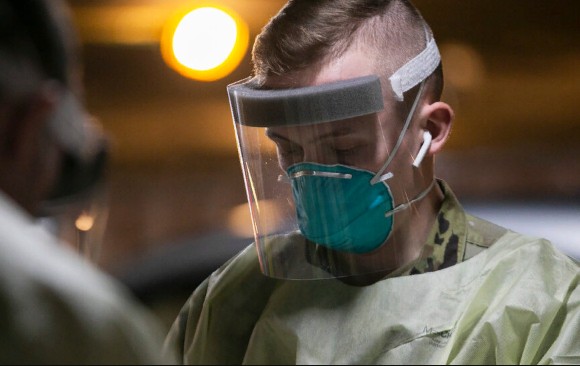The team of Vice President Joe Biden sees reasons to be optimistic in the latest data.
According to statistics released on Friday by the Centers for Disease Control and Prevention, booster doses of the Pfizer-BioNTech and Moderna vaccines aren’t just avoiding infections with the extremely contagious Omicron variety – they’re also preventing sick Americans from ending up in the hospital.
According to the agency, the extra dosages are 90 percent effective in preventing hospitalization with the variation. Booster shots also decreased the likelihood of a trip to the ER or an urgent care center. According to the findings, the extra dosages were most effective against infection and death among Americans aged 50 and up.
Overall, the new findings reveal that the vaccines were more effective against the Delta variation than against Omicron, which has been shown in lab experiments to be somewhat immune-evading.
Booster shots are widely believed to keep people from being infected, at least for a short time. Boosters have also been shown to help avoid severe sickness and hospitalization in older persons, according to data from Israel and other nations.
«Data from other countries has also showed great advantage of having the booster, but this is truly proving it in the United States,» said Akiko Iwasaki, an immunologist at Yale University. «These figures should persuade a lot of people.»
The Centers for Disease Control and Prevention (CDC) released new data on Thursday night revealing that unvaccinated Americans 50 and older were 45 times more likely to be hospitalized in December than those who were vaccinated and had the third injection.
Despite this, only about 40% of Americans who are fully vaccinated and eligible for a booster dose have obtained one.
By day, new doses have been reported.
CDC | Note that the line is a seven-day average. On some weekends and holidays, data is not updated. As of March 5, 2021, the Johnson & Johnson vaccination is included. The Centers for Disease Control and Prevention, in partnership with the states, occasionally revises data or reports a single-day high rise in vaccinations from earlier dates, resulting in an irregular pattern in the daily reported figures.
The findings released on Friday are based on three new research led by the Centers for Disease Control and Prevention. From August 26, 2021, to January 5, 2022, researchers looked at hospitalizations and visits to emergency rooms and urgent care clinics in ten states.
The scientists discovered that the vaccine’s effectiveness against hospitalization with the Omicron strain dropped to barely 57 percent among those who had gotten their second dose more than six months before. A third dose increased the level of protection to 90%.
According to Natalie Dean, a biostatistician at Emory University, it’s unknown whether the boosters’ protection will decline as it did after two shots.
«We just have to accept that all of these Omicron third-dose protection estimates are going to come from folks who have just been boosted,» she added. «We’re concerned about the boosters’ long-term viability.»
Scientific experts to the Food and Drug Administration and the Centers for Disease Control and Prevention criticized the lack of booster shot data relevant to the United States while arguing booster shot recommendations for all American people.
They claimed that variations between Israel and the United States — such as how Israel defines severe sickness — made interpreting the relevance of Israeli statistics for Americans difficult.
Even before the agencies’ scientific advisers had an opportunity to study the data from Israel, some officials of the Biden administration supported the use of booster doses. Following the arrival of the Omicron variety, federal health officials ramped up their boosters-for-all campaign.
Booster shots are now recommended for everyone 12 and older, five months after receiving two doses of the Pfizer-BioNtech and Moderna mRNA vaccines, or two months after receiving a single dose of the Johnson & Johnson vaccine.
The effectiveness of booster shots in Americans under the age of 50 was a big topic in the fall. At the time, several specialists argued that third shots were unnecessary for younger adults because two doses of the vaccine had proven to be effective.
The fresh facts did not persuade all of those experts.
Dr. Paul Offit, director of the Vaccine Education Center at Children’s Hospital of Philadelphia and a member of the FDA’s vaccine advisory council, said it was evident months ago that older persons and those with impaired immune systems would benefit from more vaccine doses.
However, he questioned, «Where is the evidence that a third dose benefits a healthy young person?»
«Vaccinate the unvaccinated if you’re attempting to stem the spread of this virus,» he continued. «We continue to strive to safeguard those who are already protected.»
However, because of the extremely contagious Omicron strain, several experts changed their thoughts and now recommend boosters. They claimed that even if two doses were sufficient to keep young individuals out of hospitals, a third dose could prevent infections and so restrict virus spread.
«Both are data-driven, respectable perspectives,» said John Moore, a virologist at New York’s Weill Cornell Medicine. But the debate is done at this point: «We’re utilizing boosters in everyone, and that’s what’s going on.»


Be the first to comment on "The team of Vice President Joe Biden sees reasons to be optimistic in the…"